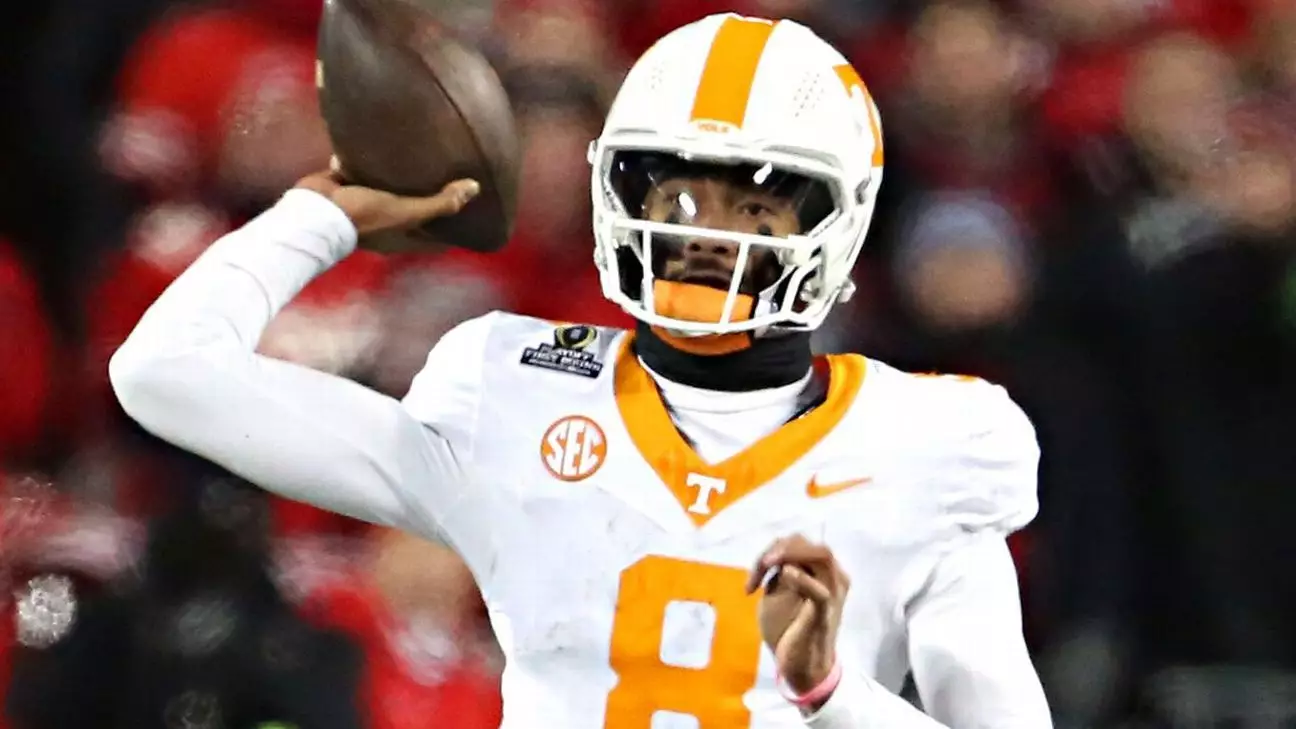The world of college football is in constant flux, forever reshaped by the transfer portal—an evolving mechanism that amplifies the struggles and triumphs of young athletes navigating the labyrinth of recruitment, financial expectations, and team loyalty. The recent headline-stealing potential transfer of Nico Iamaleava from Tennessee to UCLA encapsulates this dynamic landscape. As the discourse unfolds, it raises profound questions—not only about the prospects of teams attempting to build strong rosters but also about the underlying ethics and motivations driving these young athletes. The stakes are stratospheric, not only for teams but also for the players whose future hangs in balance with every decision made.
The Athletic Business Transformation
Iamaleava, a gifted quarterback with immense talent and a storied high school career, stands at the heart of a burgeoning commercial enterprise within college sports. His expected move to UCLA isn’t merely a team enhancement; it’s poised to radically alter the landscape around the Bruins’ program under Coach DeShaun Foster. Iamaleava’s previously reported financial asks, such as at least $4 million—a figure that UCLA seems ill-equipped to meet—illustrate the new business realities permeating college athletics.
While it’s commendable that players are beginning to capture a piece of the financial pie, the need for such immense compensation reveals a troubling imbalance, especially between programs with deep resources and those without. Are we witnessing the commodification of young athletes, where their loyalty shifts in response to monetary incentives rather than team culture? There’s something unsettling about treating college football as a transactional business compared to the rich traditions and community-centered values that once encapsulated the sport.
A Clash of Loyalty and Commercial Interests
Furthermore, Iamaleava’s journey shines a light on loyalty—or the lack thereof—between players and programs. After a first season filled with promise, including a stint in the College Football Playoff, the sudden pivot to transfer underscores a deep-seated tension. Tennessee Coach Josh Heupel’s blunt declaration that “no one is bigger than the Power T” directly confronts the entitlement that often grows in the wake of celebrity status in sports. It speaks volumes: What happens to team cohesion when players can jump ship upon their own whims?
This clash is not just about Iamaleava and Tennessee; it represents a broader trend where young, impressionable athletes are snatching back power in an environment that has historically relegated them to subordinate roles. They are leveraging their unique positions to carve out individual narratives, yet one must wonder if future generations will consistently prioritize the ethos of teamwork when tempted by lucrative offers.
UCLA on the Brink of Revival or Ruin?
For UCLA, the potential addition of Nico Iamaleava could resurrect a program yearning for greater success after stumbling through a lackluster 5-7 season. Deshaun Foster is clearly betting on a charismatic figure to inject energy back into the Bruins, and Iamaleava certainly fits that mold. Yet, are they prepared to navigate the precarious balance of building a cohesive team while appeasing the financial expectations that come with recruiting elite talent?
UCLA’s disappointing offensive performance last season underscores the urgency and necessity of this move. Iamaleava could provide an immediate jolt to the scoring dynamics, yet it remains to be seen whether his talent can harmonize within the existing team framework. What happens when an over-reliance on a single player stands at odds with the collective? Football is fundamentally a team sport, and the risks of sacrificing team-oriented development for the allure of a star quarterback cannot be overstated.
As the prospect of Iamaleava’s transfer looms, the conversation shifts beyond the typical football chatter. We must critically examine what this means for the future of college athletics—will it become a free-for-all driven by market values, or can it maintain some semblance of integrity? Nico Iamaleava’s story serves as a microcosm of the broader issues at stake in college sports. We are at a crucial juncture, where the paths taken today will inevitably shape the legacies of our treasured programs and the players who inhabit them. Let us hope that in the race for profit, we do not lose sight of the fundamental values that unite us all in the love of this sport.

